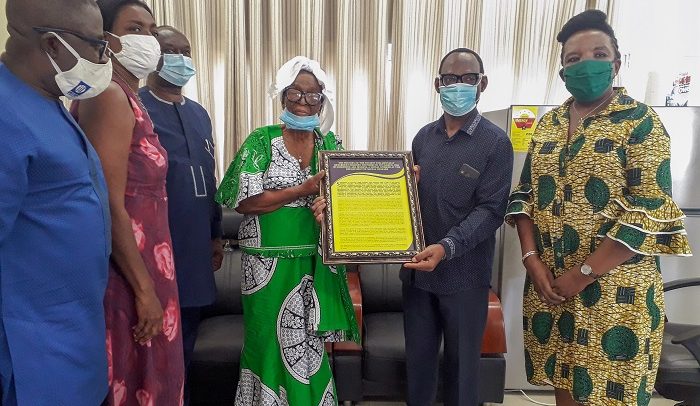Aba Jenkins presents citation to Mr Gyasi, Chief Director of the Ministry of Education
One of Ghana’s early social workers, Josephine Aba Jenkins, has compiled the history of the Society for Mentally Retarded Children, which document she presented to the Ministry of Education last Friday in Accra in the company of some family members.
In her remarks during the presentation, she said she deemed it a duty to let Ghanaians know about the society as the surviving founder, having started, as she added, with support from the then Inspector General of Police (IGP), J.W. K. Harley, as patron-in-chief with an initial membership of 320 out of which only three are alive.
The decision to form the society was based on recommendation from the then German Ambassador to Ghana, Helmut Mullet, after she encountered a terrible situation at the Accra Psychiatric Hospital at a time when Professor Chris Adomako was the head, she recalled.
“I visited the mental hospital and found some children roaming about, so I asked the nurses whether the patients were allowed to come in with their children and she said no, and that these were children they picked from the streets, abandoned children!” she said.
The situation, she said, gave her sleepless nights for almost two weeks, hence her decision to seek support to help the children.
On behalf of the minister, Mathew Opoku Prempeh, the Chief Director of Education, Benjamin Gyasi, commended the pioneers of the society for their effort and said that beyond giving better education to such children, the agenda to take care of such children should be in place.
Madam Jenkins, who hails from Abura Dunkwa in the Central Region, attended Methodist Primary School in Kumasi from 1940 to 1944, and then proceeded to St Monica’s Convent from 1945 to 1949.
She traveled in 1956 to the United Kingdom to pursue her “O” level at North Western Polytechnic in London after which she acquired a Central Training Council Certificate in Residential Care for Children from the same institution in 1960.
She returned to Ghana and was employed at the Department of Social Welfare where she worked from 1962 to 1970.
By Issah Mohammed


